Key takeaways:
- Annual reviews are essential for growth, facilitating meaningful dialogue and aligning personal and organizational goals.
- Setting specific, measurable, and collaborative goals during reviews enhances accountability and professional development.
- Preparation for reviews, including documentation and self-reflection, transforms the experience into an opportunity for meaningful discussion.
- Post-review action plans and regular progress checks keep goals at the forefront and reinforce commitment to growth.
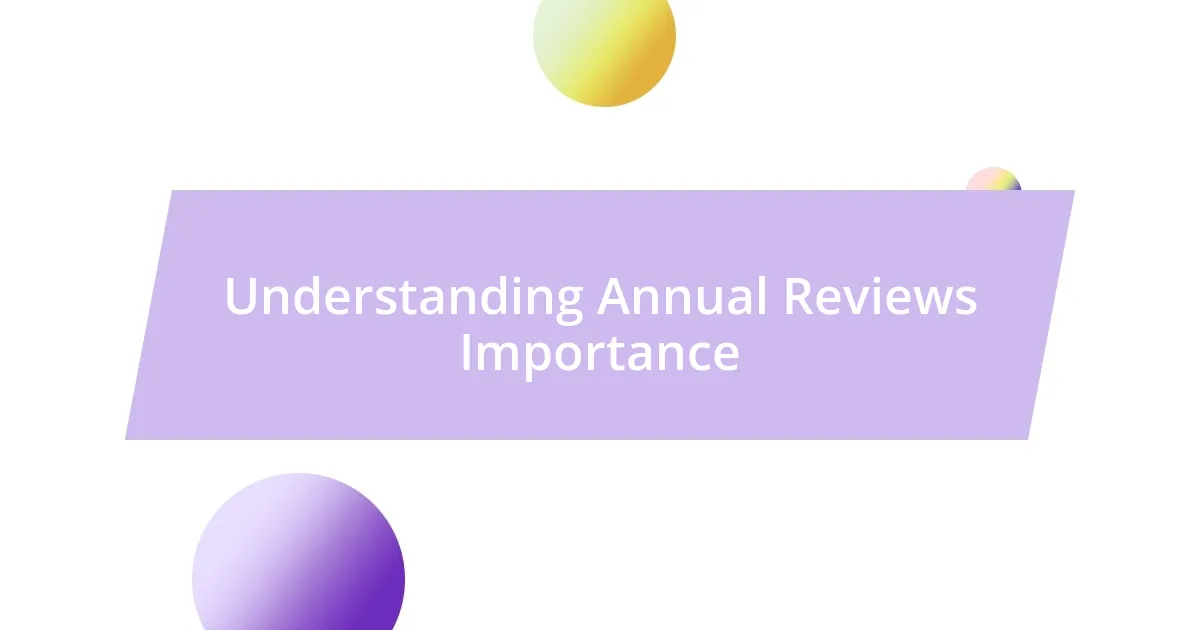
Understanding Annual Reviews Importance
When I reflect on my experiences with annual reviews, I realize they are more than just a checkbox on the corporate calendar; they’re pivotal moments for growth. I still remember my first review—it felt daunting. But that conversation turned out to be a catalyst for my professional development, as it revealed areas where I excelled and those needing improvement.
Annual reviews also serve as a unique opportunity for meaningful dialogue between employees and management. Have you ever considered how these discussions can forge stronger relationships in the workplace? I’ve found that open feedback can bridge gaps that might otherwise go unnoticed, fostering a team culture built on trust and mutual respect.
Moreover, understanding their importance can clarify an organization’s goals and align personal aspirations with team objectives. I’ve seen how a clear review process can motivate individuals to strive for excellence. It’s about recognizing achievements, yes, but also about setting a vision for the future together, making everyone feel valued in their role.
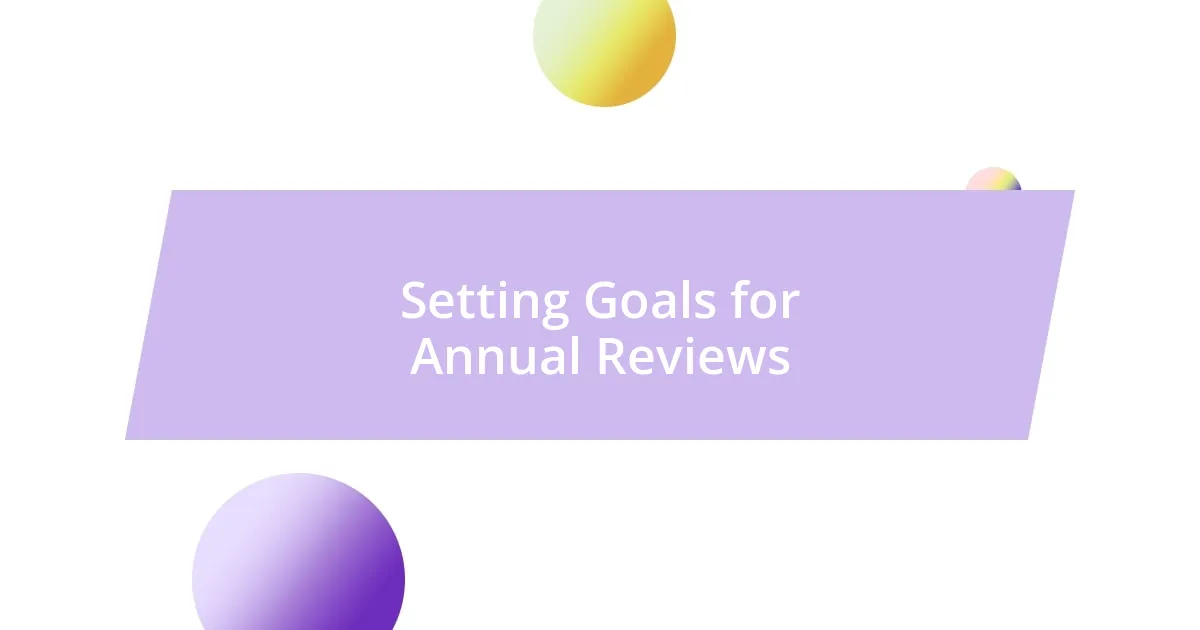
Setting Goals for Annual Reviews
Setting goals during annual reviews is a critical part of the process. When I first started, I often set vague goals, like “improve communication skills.” However, over time, I’ve learned to make my goals specific and measurable—something like “lead a team meeting once a month.” This shift had a significant impact on my growth; I could track my progress and celebrate small victories along the way.
One aspect I find essential is involving my manager in goal-setting. When we collaboratively outline my objectives, it creates a sense of shared responsibility. For instance, I remember when I wanted to enhance my project management skills. By discussing this with my manager, we identified clear milestones and resources that helped me stay on track. This partnership not only kept me accountable but also deepened our working relationship.
Finally, I’ve discovered the benefit of revisiting and adjusting my goals throughout the year. Life can be unpredictable, and sometimes the goals I set back in January may no longer apply by March. I learned to be flexible. I’ve had moments where revising my goals felt empowering, as it allowed me to adapt to new circumstances while keeping my professional growth at the forefront of my mind.
| Goal Type | Description |
|---|---|
| Specific Goals | Clear and focused objectives that can be measured. |
| Collaborative Goals | Objectives set in conjunction with a manager for accountability. |
| Flexible Goals | Adaptable targets that can change based on evolving circumstances. |
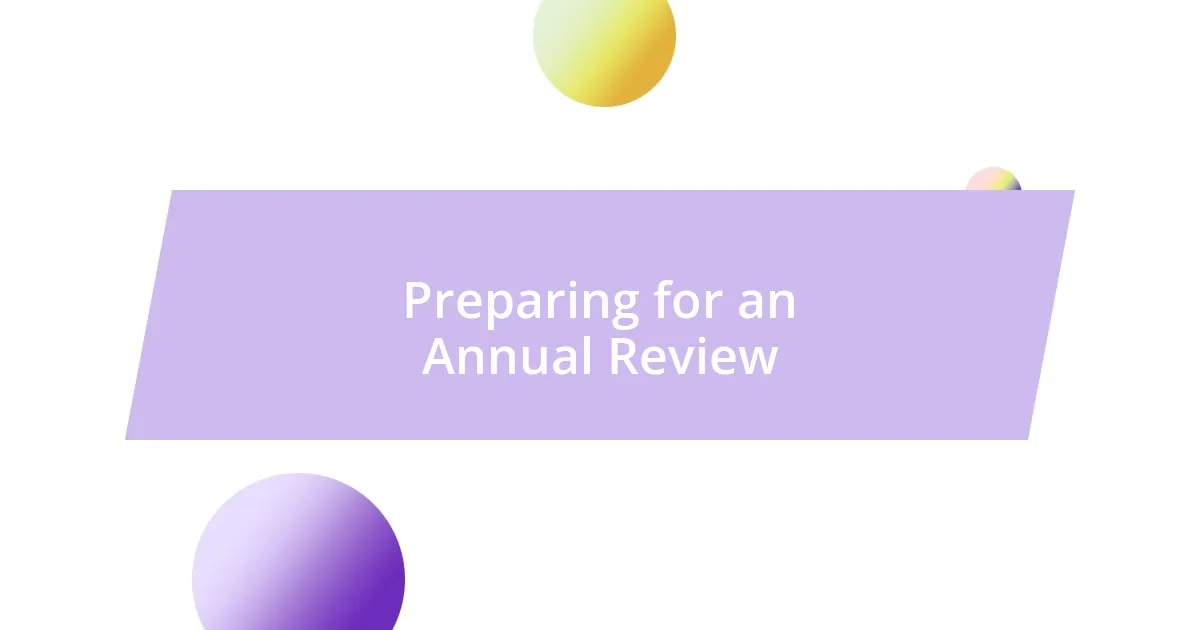
Preparing for an Annual Review
Preparing for an annual review can be both exciting and nerve-wracking. I remember when I used to slip into preparation at the last minute, often with a sense of dread. However, I learned that starting early not only eases anxiety but also allows for a more thorough reflection on my accomplishments and areas for growth. Writing down my thoughts in advance has transformed my preparation process into a meaningful exercise that helps me articulate my journey over the past year.
Here are some key steps I take to prepare effectively:
- Gather Documentation: I compile relevant documents, such as past performance reviews, project summaries, and feedback.
- Reflect on Achievements: I list my key contributions and celebrate my successes, no matter how small they seem.
- Identify Challenges: Recognizing my struggles helps me present a balanced view during the review.
- Set Future Objectives: I think about my goals and aspirations, framing them in a way that aligns with both my personal ambitions and the organization’s objectives.
By following these steps, I’ve turned what once felt like a stressful obligation into an opportunity for personal growth and meaningful discussion.
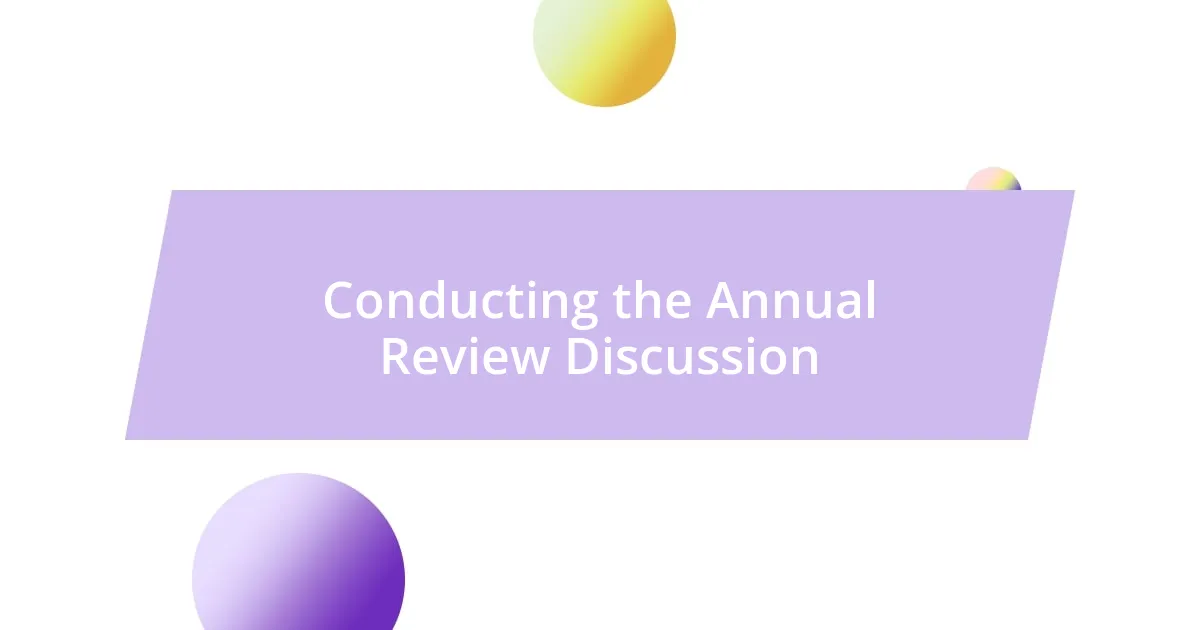
Conducting the Annual Review Discussion
When it comes to conducting the annual review discussion, I’ve learned that setting the right tone is crucial. I recall a time when my discussion felt more like an interrogation than a conversation. By approaching these talks with a mindset of collaboration and openness, I noticed how the atmosphere shifted. It made me feel more at ease and willing to engage in honest dialogue about my performance and aspirations.
I’ve found that sharing specific examples during the discussion can significantly enhance clarity and understanding. For instance, I once discussed a project where I faced considerable challenges. Instead of just outlining the issues, I illustrated how I pivoted and adapted my approach. This not only highlighted my problem-solving skills but also demonstrated my growth mindset. Have you ever considered how sharing your narrative can elevate the conversation? I absolutely believe it adds a human touch that makes the figures and achievements relatable.
Listening actively during the review is equally important. I remember a moment when my manager provided insightful feedback about my teamwork abilities, but I was so focused on my points that I almost missed it. Taking a step back to truly absorb their perspective transformed the discussion into a two-way exchange and enabled me to grasp areas where I could grow. It’s such a simple shift—don’t you think? Yet, it can be incredibly powerful in reinforcing a collaborative environment and fostering trust.
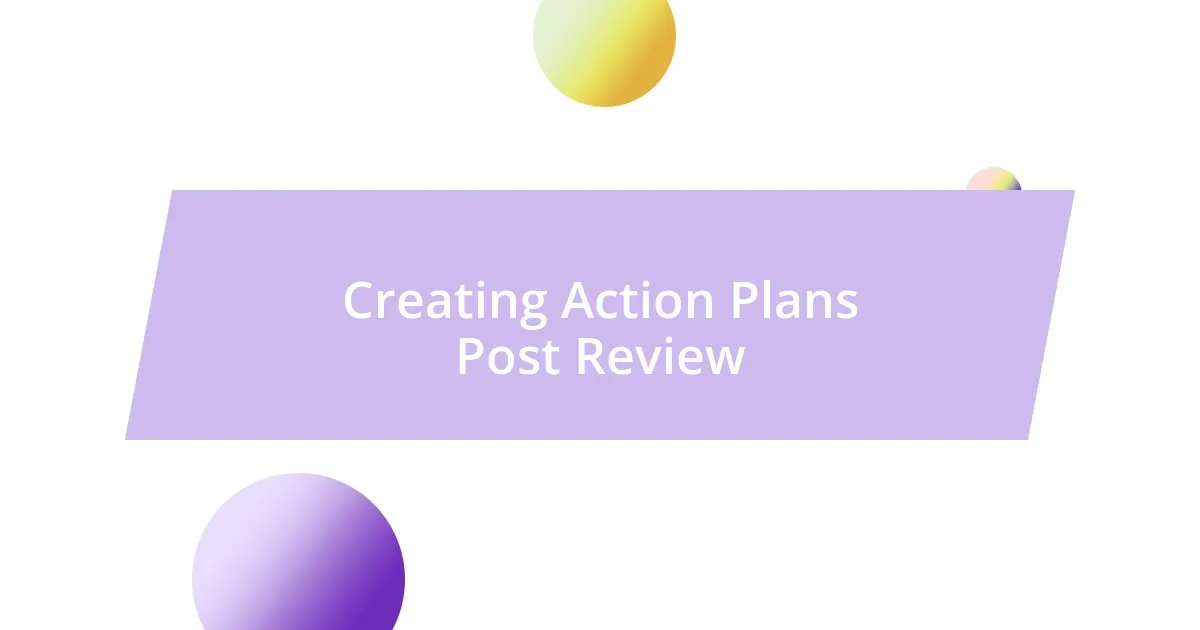
Creating Action Plans Post Review
Creating actionable plans after an annual review is essential for turning discussions into tangible outcomes. I always find it helpful to jot down specific action items right after my review while the conversation is still fresh in my mind. Once, after a particularly enlightening discussion, I realized I needed to enhance my leadership skills. So, I set a clear goal: enroll in a leadership training course within the next quarter. This not only kept me accountable but also gave me a sense of direction.
One thing I’ve learned is the importance of breaking down larger goals into smaller, manageable tasks. For instance, if improving my public speaking skills is an objective, I create a mini-plan that includes joining a local Toastmasters group and seeking out opportunities to present at team meetings. I remember how daunting public speaking seemed at first, but with each little step, my confidence grew. Isn’t it interesting how a systematic approach can transform an intimidating goal into an achievable journey?
Lastly, I find it crucial to set check-in points to evaluate my progress. After implementing my action plan, I like to schedule brief follow-ups with myself or even with my manager. This keeps my goals at the forefront and holds me accountable. During one of these check-ins, I was surprised to realize how much my skills had improved. Reflecting on my progress fuels my motivation. Have you ever noticed how having concrete milestones helps maintain momentum and drive? It’s a game-changer, reinforcing the commitment to growth while keeping my aspirations alive.
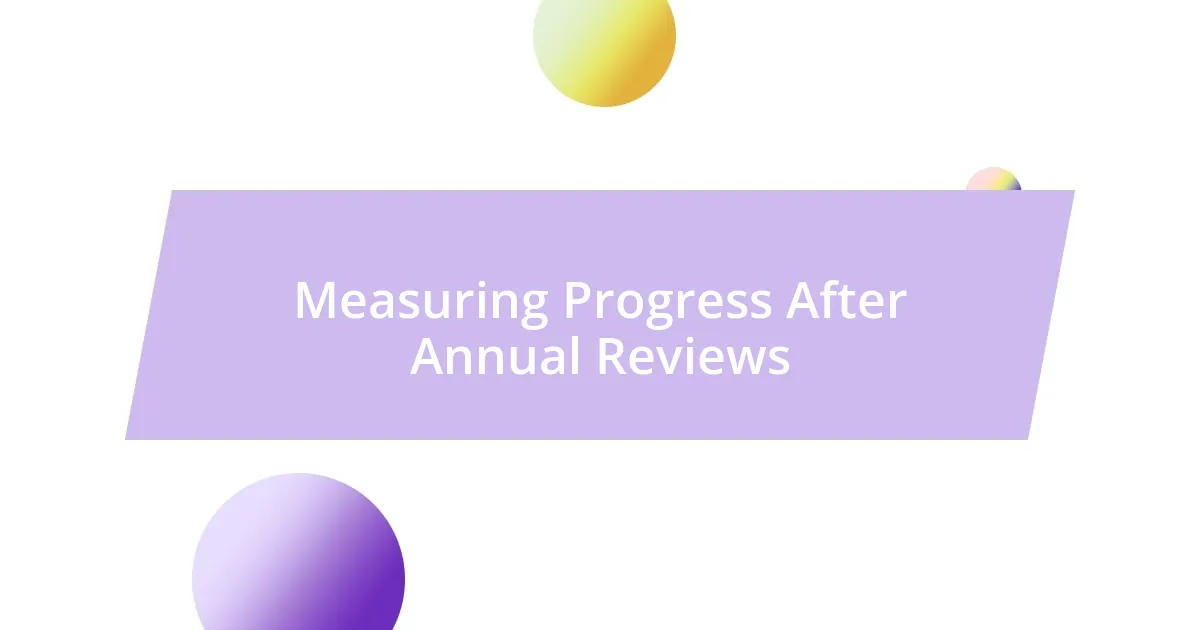
Measuring Progress After Annual Reviews
Measuring progress after my annual review has always been a personal priority. I recall when I decided to track my growth through a simple spreadsheet. I documented specific skills and projects, updating it regularly as I completed tasks or received feedback. Having this visual representation of my journey made me feel accomplished and motivated. Isn’t it satisfying to see your hard work laid out in front of you?
Another effective strategy I’ve used is seeking ongoing feedback from my manager and colleagues. After one review, I learned that gaining input on my teamwork skills was essential for improvement. I committed to checking in with peers weekly, asking them for one piece of constructive feedback. The reactions were often surprising and helped me identify blind spots. Can you imagine how eye-opening it can be to uncover areas you never thought of? It’s amazing how much can be learned from those around us.
I also find that celebrating small wins keeps my spirits high and reinforces my growth. For instance, after mastering a particular software tool mentioned during my review, I treated myself to a nice dinner. Reflecting on these moments not only provides a psychological boost but also reminds me of the real progress I’ve made. Have you ever celebrated your achievements, no matter how minor? It’s those little joys that invigorate the journey and encourage continued growth.














